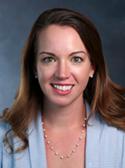“Be Like A Duck”
Sarah Young is an assistant professor of political science and serves as Assistant Director of Academic Engagement.
I don’t need to repeat that this semester is unprecedented. We are all doing our very best to meet the needs of our students and the needs of our families, and to keep our heads above water. My mantra this semester is “be like a duck.” By this, I mean that I am trying my best to float along with my head above water in what I hope appears as a nice, calm glide; all the while, my feet are running a mile a minute under the water. So, when CTLL asked me at the start of this semester to write a post about what engagement looks like for me during this chaotic semester, I think I actually laughed out loud a little.

My first reaction was “Engagement? Community? Classroom? Um…hello…we’re in a pandemic?!” All of my carefully crafted plans to connect the community and the classroom in Fall 2020 had fallen to pieces. That new course Hall County’s administration and I built that would allow students to learn from inside the walls of local government? Puff, gone! Too much liability to run a whole course off campus. That major research project I planned for my MPA course where students would research hand-in-hand with local and state government administrators? Decimated. Bureaucracy has more pressing matters to attend to right now. That idea to run a major TedX event on campus featuring social equity and justice issues? Dissolved. Hard to host a huge community event if there can’t be more than 50 people in attendance.
But, in the spirit of trying to “be like a duck,” I wrote back and said “Sure! … But could I have a month or two to work on it?”—hoping against hope that I’d come up with something positive to contribute by then. I’m glad I waited.
The last seven or so weeks were eye-opening for me, in a really good way. I’ve witnessed our university community’s resilient spirit. The faculty, staff, administration, and students’ commitment buoyed me.
Our faculty and staff’s dedication is inspiring. Faculty swiftly undertook the task of adopting entirely new pedagogical approaches to meet both the students’ and the communities’ needs—faculty like Dr. Efren Velazquez, who challenged his community psychology class to find a community nonprofit, research their needs by means of virtual interactions, and develop an intervention. Staff pivoted to not only support the extraordinary needs of our university community during this time but also asked, “what else can we do to help?”—staff like Sandy Ott and Hannah Reed who, along with the REACH program coordinators, are planning a virtual summit for REACH scholars who need extra support right now.
Our administration’s recognition of our students’ personal struggles and their perseverance to find solutions through innovation is one of the most authentic examples of leadership I’ve seen. Consider Jennifer Herring who, just this semester, launched UNG’s new Gen1 mentorship program that will match first generation students with first generation faculty mentors.
However, it is our students’ resiliency and compassion that has absolutely taken my breath away. Even amidst what is likely the most challenging personal and scholastic period of their lives, our students have been the ones to lead new initiatives needed to fill community gaps—students like Lana Goitia, whose internship at the Georgia Legislature was canceled, whose graduation was unceremonious, and whose wedding was postponed because of COVID-19. But Lana did not let that stop her. Instead, she recognized that this extraordinary period in history would make it more difficult for citizens to vote, so she signed up as a volunteer for the ACLU. Her volunteering led to a prestigious fellowship, and now full-time employment as the ACLU’s north Georgia voting rights organizer.
Our students are the embodiment of the Nighthawk spirit. Other students have taken it upon themselves to plan fundraising events for veterans suffering from PTSD, organize carpooling to early voting precincts, lead virtual read-ins for local elementary school classes, arrange clean-up initiatives for our local cemeteries—the list goes on and on. Our university community proverbially shouted back that we will not only survive, we will thrive when faced with complexity and change.
Thank you, UNG community, for being my buoy during this difficult time. You have inspired me to paddle harder. And while this is not a complete list, I want to recognize some of the extraordinary examples of engagement that our faculty, administration, staff, and students have undertaken during this pandemic. I hope this list inspires you, too.
- Rana Gautam’s class is providing grant impact analysis for the United Way of Hall County
- Professor Tiffany Joy Prater’s class held a logo competition to develop logos in support of UNG’s “get out the vote” initiative
- Caroline Munoz’s class is developing digital marketing and social media content for several local nonprofit organizations, include Family Haven
- Madeline Altabe’s class is undertaking an evaluation and outcome project for the nonprofit organization Bald Ridge Lodge
- UNG Cadets helped unload, store, and distribute food for Lumpkin County’s Sunrise Club, which will be distributed to families in need
- David Patterson and Professor Rosann Kent developed a partnership with Lumpkin County Schools to expand the Hometown Harvest program and offer nutritional education
- Sabrina Maginnis developed internship opportunities to support the Hometown Harvest’s new education program for Lumpkin County Schools
- Professor Hugh Scott developed Profs on Call, a program that provides free technical assistance for local businesses through community chambers of commerce
- HSDA interns obtained new grant funding for the United Way of Hall County
- Carly Redding is developing a domestic service-learning program with the Northern Arapaho Tribe
- Bobbi Larson and Ms. Mallory Rodriguez helped a student become a representative on Lumpkin County’s Veterans Affairs Council
- Sarah Williams and Dr. Kimberly Davidson are developing culturally relevant service-learning projects for education students working within the local school systems
Leave a Reply